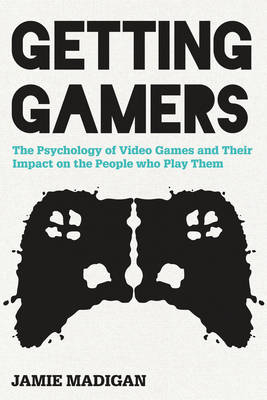
Getting Gamers
Rowman & Littlefield (Verlag)
978-1-4422-3999-9 (ISBN)
- Titel ist leider vergriffen;
keine Neuauflage - Artikel merken
Video games are big business. They can be addicting. They are available almost anywhere you go and are appealing to people of all ages. They can eat up our time, cost us money, even kill our relationships. But it’s not all bad! This book will show that rather than being a waste of time, video games can help us develop skills, make friends, succeed at work, form good habits, and be happy. Taking the time to learn what’s happening in our heads as we play and shop allows us to approach games and gaming communities on our own terms and get more out of them.
With sales in the tens of billions of dollars each year, just about everybody is playing some kind of video game whether it's on a console, a computer, a web browser, or a phone. Much of the medium’s success is built on careful (though sometimes unwitting) adherence to basic principles of psychology. This is something that’s becoming even more important as games become more social, interactive, and sophisticated. This book offers something unique to the millions of people who play or design games: how to use an understanding of psychology to be a better part of their gaming communities, to avoid being manipulated when they shop and play, and to get the most enjoyment out of playing games. With examples from the games themselves, Jamie Madigan offers a fuller understanding of the impact of games on our psychology and the influence of psychology on our games.
Jamie Madigan, PhD, has become an expert on the psychology of video games and seeks to popularize understanding of how various aspects of psychology can be used to understand why games are made how they are and why their players behave as they do. Madigan has written extensively on the subject for various magazines, websites, blogs, and his own site at psychologyofgames.com. He has also consulted with game development companies and talked at conferences about how game developers can incorporate psychology principles into game design and how players can understand how it affects their play. Finally, he has appeared as an expert on the psychology of video games in dozens of print, radio, and web outlets such as The Washington Post, the Chicago Tribune, BBC Radio 5, the BBC, The Guardian, and more. He is a lifelong gamer and lives in St. Louis, Missouri.
Introduction
1: Why Do Perfectly Normal People Become Raving Lunatics Online?
2: Why Do People Cheat, Hack, and Peek at Strategy Guides?
3: Why Are Fanboys and Fangirls So Ready for a Fight?
4: Why Do We Get Nostalgic About Good Old Games?
5: How Do Games Get Us to Keep Score and Compete?
6: How Do Games Get Us to Grind, Complete Side Quests, and Chase Achievements?
7: How Do Developers Keep Us So Excited About New Loot?
8: How Do Games Make Us Feel Immersed in Imaginary Worlds?
9: Why Do We Go Crazy for Digital Game Sales?
10: How Do Facebook Games and Smartphone Apps Get You With In-Game Purchases?
11: How Do Games Keep Players Paying?
12: How Do Games Get Players to Market to Each Other?
13: Do We Shape Our In-Game Avatars or Do They Shape Us?
14: Why Do We Like Violent Games So Much? And Should We Be Worried That We Do?
15: Do Video Games Make You Smarter?
Outroduction: Where Do Psychology and Video Games Go From Here?
| Erscheint lt. Verlag | 16.12.2015 |
|---|---|
| Verlagsort | Lanham, MD |
| Sprache | englisch |
| Maße | 158 x 238 mm |
| Gewicht | 626 g |
| Themenwelt | Geisteswissenschaften ► Psychologie ► Entwicklungspsychologie |
| Geisteswissenschaften ► Psychologie ► Sozialpsychologie | |
| Informatik ► Weitere Themen ► Computerspiele | |
| Sozialwissenschaften | |
| ISBN-10 | 1-4422-3999-9 / 1442239999 |
| ISBN-13 | 978-1-4422-3999-9 / 9781442239999 |
| Zustand | Neuware |
| Haben Sie eine Frage zum Produkt? |
aus dem Bereich


